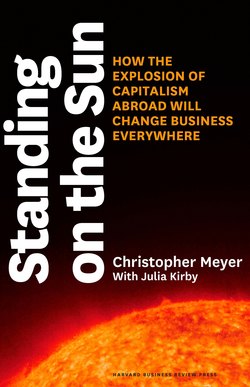Читать книгу Standing on the Sun - Christopher Meyer - Страница 25
На сайте Литреса книга снята с продажи.
The Peacock's Tale
ОглавлениеOne special case in biology turns out to be unfortunately common in economics: the runaway effect. As the term implies, this is what happens when a feedback loop gets established that reinforces a trait beyond all reason. Like a runaway horse, it's hard to rein in.
The best way to describe this effect is with reference to the classic example: the peacock's tail. How has it come to be so extravagant? Well, because peahens are partial to males with long tails. This means that if you're a peacock, size matters: more tail, more offspring.
If you live, that is. The challenge is that growing and hauling about that large ornament is as expensive as owning a Ferrari; it costs the peacock energy, meaning it needs more food. Worse, unlike a man with a Quattroporte, the peacock is slowed down by that attractive appendage, making it more difficult to elude predators. In nearly every species of bird and beast, females select males based on visible attributes, but in the vast majority of cases, those attributes are legitimate signifiers of survival strength. In the case of the peacock, sexual selection fails to align with fitness selection. So the peacock lives a shorter, if perhaps happier, life, but the net is that there are fewer peacocks in the ecology. You can see why experts on evolution also like to call this phenomenon biological suicide.
Nature has had billions of years to sort out this problem, so it's rare in ecologies. Human society is newer to the game, so the potential for runaway effects is higher. Indeed, R. A. Fisher, the British scientist who first described the phenomenon in the 1920s, was quite aware of its applicability to social matters. According to Mary Bartley, a student of his work, Fisher “often contrasted sexual selection with its well-known counterpart, natural selection, and used both of these brands of ‘selection’ to discuss fundamental problems impeding the progress of British society.” He was fond of extrapolating to worst-case scenarios; using the analogy he would warn that, if certain problems were not corrected, their runaway nature could lead to the nation's demise.
Picture the financial trader in the role of peacock, incented by short-term profits to undertake behavior that increases systemic risk for the financial species. Or the manager selected for the extravagance of his return on equity rather than for the ability to generate value on many dimensions. Or the CEO told incessantly by Wall Street analysts that quarterly profits are the essence of running a company. Runaway effects happen when a single criterion governs resource allocation—the economic equivalent of sexual selection—without balancing other criteria that determine the overall value of the choice to society.
Readers who have spent careers in management might think of this as a special class of unintended consequences—those logical but somehow unforeseen effects that often take place following bold managerial interventions. A common example is a new incentive system that aims to motivate some narrow behavior and does so at the expense of the overall health of the system. Steve Kerr, a longtime colleague of Jack Welch (Kerr led the creation of GE's management training facility in Crotonville, New York, and now serves as a dean of the online MBA program Jack Welch University), wrote about such cases in a classic management article, “On the Folly of Rewarding A While Hoping for B.”
Unintended consequences happen all the time in human rule making. Our favorite recent example is the legislation in Indonesia designed to reduce its awe-inspiring traffic jams. Perceiving that carpooling would make a difference, the government created new traffic lanes that could be used only by vehicles carrying more than one occupant (such lanes are common in many urban settings). But in a land filled with poor people with time on their hands, the main effect was to create a new industry: passengers for hire. A sort of inverse to taxi stands started to show up: lines of people at entrances to highways willing to hop in any car that would hire them as its ticket to the high-occupancy vehicle lane. The net effect was not only an unintended consequence but also an outright negation of the original goal to improve traffic flow.
Often, organizations or societies rely on cultural norms to rein in a runaway incentive. But a strong enough selection for the incented behavior can actually change the norms. (Recall Frank Lorenzo and the Florida home flippers.) Without law enforcement, regulation, morality, or some other form of social code to represent the nonfinancial interests of society, the combination of runaway selection and moral hazard can lead to something like “social suicide.” This is a line of thought we return to in chapters to come—and a crucial thought in understanding the forces that drive the selection of rules in the capitalist system.
